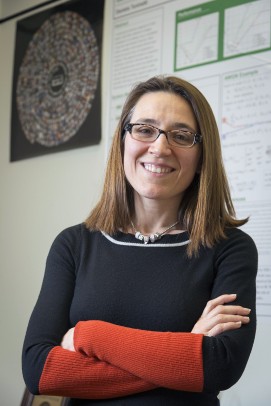Seeing the future service needs of wireless networks
What kind of service will future 5G wireless networks need to provide to users?
That’s one question Daniela Tuninetti aims to answer in her research.
“We’re working on what will happen in about 10 years from now,” said Tuninetti, associate professor of electrical and computer engineering. “We’re already thinking of what you might want from your phone, how much data you might need and how we should design better performing networks.”
Tuninetti studies the mathematics behind communications networks and how these networks can be improved for optimal performance.
“Information Theory, my main field of research, provides a benchmark against which any practical technology should be compared,” she said. “If you’re far from that benchmark, then aspects of the design need to be improved.”
Another aspect of Tuninetti’s research applies electrical engineering principles to medical applications. She is collaborating with UIC College of Medicine professor Konstantin Slavin and UIC engineering professor Daniel Graupe to develop technology for on-demand deep brain stimulation to reduce tremor symptoms in patients with Parkinson’s disease or essential tremor.
“Once these devices are implanted, the brain stimulation is constant over time,” she said. “We’ve provided a proof of concept that it’s possible to switch off that stimulation for a certain period of time and patients are still having some of the good benefits of the stimulation. “The kind of technology we develop figures out when the tremor is about to reappear and switches stimulation on again. It is envisioned to have applications well beyond tremor disorders.”
Turning off the constant stimulation has its benefits, she said.
“These devices have batteries so if you use the stimulation half of the time, you will maybe have less surgeries for battery replacements,” she said. “Some symptoms are also sometimes made worse by the stimulation, such as speech.”
Tuninetti is collaborating with UIC engineering professors Natasha Devroye and Danilo Erricolo as well as a professor at Purdue University to answer a critical problem addressed in the 2012 report of the President’s Council of Advisors on Science and Technology. They received a grant from the National Science Foundation to study whether wireless data networks can share the spectrum with radar systems, which are used for airplane tracking, for example.
“If they coexist in the same bandwidth, how much interference would they cause one another?” she said. “You might have radar that misses some of the planes. We are trying to figure out how much performance will be downgraded by having the two systems share the same spectrum, then put solutions in place.”
Tuninetti also teaches a mix of undergraduate, graduate and doctoral students.
“I really strive to make sure students understand the basic concepts — that they see the impact of technology today but also see beyond them because they need to be able to see what’s coming,” she said. “We’re already searching for the next thing. You should be able to imagine things that don’t exist.”
Tuninetti joined UIC in 2005, after receiving her master’s in telecommunication engineering in Turin, Italy, and Ph.D. in electrical engineering in Paris, France, then working as a post-doctoral research associate in Lausanne, Switzerland.
“I was looking for a faculty position worldwide,” she said. “I had lived many places in Europe, so I thought ‘Why not go to the U.S.?’
“I really enjoy working with my colleagues in this department; there’s good mentoring and support when you’re on a tenure track. And I love Chicago.”

